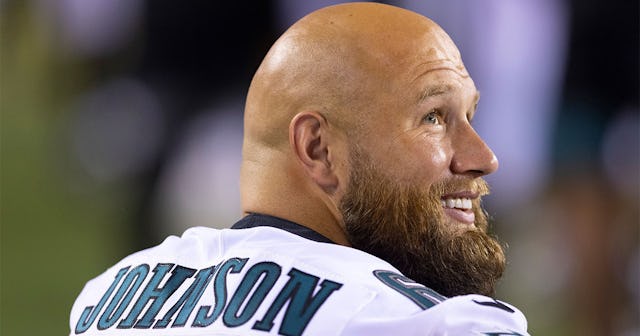Pro Football Players Step Off The Field To Address Their Mental Health

If I asked what Usain Bolt, Naomi Osaka, Simone Biles, Kevin Love, and Michael Phelps had in common, I think 2021’s general in-the-know audience might be able to tell me. Though the five athletes represent five of America’s favorite sports, each has been in the spotlight for speaking, in a very personal way, about their mental health. And recently, NFL’s formidable, hulking players are stepping front and center as well.
October was a big month for the NFL, though not in terms of yards gained or intercepted passes. Three players announced publicly that they are stepping away from the game, at least momentarily, to focus on their mental health. Baltimore Ravens’ Brandon Knight and Atlanta Falcons’ Calvin Ridley indicate they will sit out the entire season; Philadelphia Eagles’ Lane Johnson returned to the field after a three-game hiatus.
Eagles’ Johnson was the first to tweet about his departure upon returning to the game in mid-October. “I would like to thank everyone for their understanding and support over the last two weeks. I appreciate the positive notes and messages as I’ve worked hard to restore my personal life,” he wrote. “Depression and anxiety are things I’ve dealt with for a long time and have kept hidden from my friends and family. If you’re reading this and struggling, please know you are not alone….”
Speaking movingly and candidly to Fox Sports, Johnson really captured what it means to be on the precipice: “Feels like doom. I just want to run away and not come back, kind of thing. A lot of nausea. A lot of throwing up every day. It got so bad … I started to throw up blood. Nerves. Really, I have tremors in my hands.”
Offensive tackle Knight, new to the Ravens, was the next to address his uncertain mental health on October 21. He took to Twitter and explained his mid-season departure. “I’ve decided to take a break from football to address my mental health,” he wrote. “Although it was a difficult decision, it was a necessary one to be back home with my family. I look forward to returning next season.”
And, rounding off a month of brave admissions, Falcons’ Calvin Ridley also opened up.“These past few weeks have been very challenging and as much as I’d like to be on the field competing with my teammates, I need to step away from football at this time and focus on my mental wellbeing,” Ridley said on Twitter. “This will help me be the best version of myself now and in the future.”
This is not the first time that an NFL player has spoken openly about their mental health. Pittsburgh Steelers’ Hall of Famer and four-time Super Bowl-winning quarterback Terry Bradshaw did not take to Twitter, of course. (We were still using typewriters back then.) Even though he battled depression throughout his career, and even broke down and cried on the field during a game, he only spoke of it years after his 1984 retirement.
Keeping in step with the stoicism of the time, Bradshaw chose to hide his debilitating depression — most likely at a tremendous personal cost. His silence illustrates an important difference between those days and these days, a time when 87% of Americans believe mental illness is nothing to be ashamed of.
Flagging mental health may be less stigmatized in our generation, but that doesn’t make it exactly easy to disclose you are struggling. When Johnson spoke of his reluctance to go public, he broached what many of us feel. “I was ashamed, to be honest,” he confessed. “In this league, the NFL, where it’s a gladiator-type sport, it’s something that’s not often talked about but is often felt throughout the league.”
Thankfully, these three NFL players live in a world where mental health difficulties don’t automatically imply one is “less-than.” Johnson’s heartfelt tweet references the “positive notes and messages” he received. And, though Ravens’ coach John Harbough didn’t have much to say either way about Knight’s decision (perhaps because Harbough didn’t “really know the details”), the comments of Ridley’s teammate, Tajae Sharpe, reflect the Falcons’ empathy and acceptance:
“We are keeping him in our prayers and any time one of our brothers is hurting, we’re hurting as well. So we feel for Calvin and are here for him whenever he needs us and whenever he’s ready to get back to playing football. But obviously his mental health is number one and the safety of his family and his health. So whatever he needs from us, we’re going to support no matter what….”
Is it compassionate affirmation like this that has helped bolster so many mental health initiatives, like the Indiana Colts’ “Kicking the Stigma” campaign? Or, is it because of these collective efforts that we are becoming more accepting of mental health disorders? Probably a combination of both. But, the only thing that matters is that the conversation around mental illness — once a “dirty little secret” — is happening.
We are lucky to be living in a time when professional players like Knight, Ridley, and Johnson can admit to their humanness — and this is an amazing advancement in the mental health arena. In each tweet or interview about their mental health, these bigger-than-life athletes are proving that physical invincibility cannot shield any of us from mental vulnerability.
At the same time, their outward indomitability serves as an apt metaphor for the inner tenacity and perseverance it takes to combat mental illness. And anyone who has fought their own mind knows this: it takes superhuman strength to push thru the darkness. None of us are weak and none of us are “broken”; sometimes you just can’t see our warrior fighting inside.
This article was originally published on